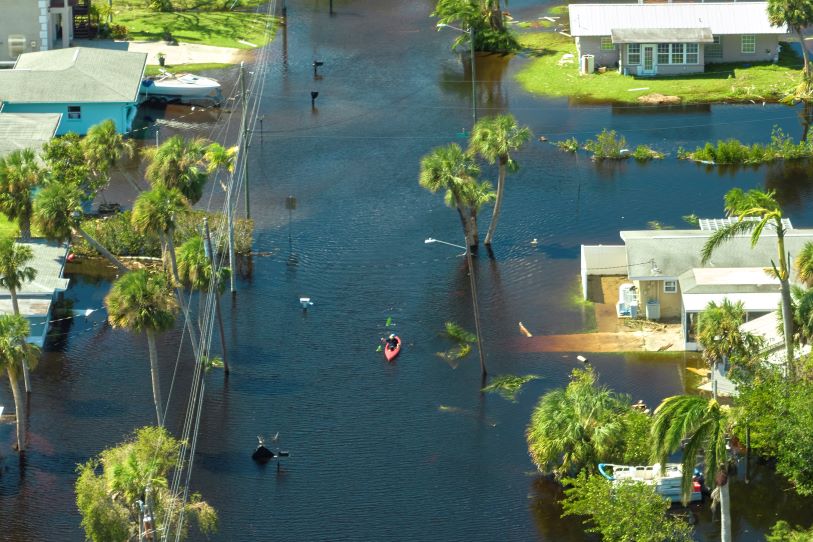
Hurricane prep is not something to leave until the last minute. Proactive steps can go a long way in protecting your home, your belongings, and your family. By securing outdoor items, reinforcing windows and doors, and ensuring your roof and gutters are in top condition, you can dramatically reduce the risk of damage. Moreover, reviewing your insurance and having emergency supplies ready will allow you to focus on staying safe during the storm.
As a Florida property owner, it’s not just about preparing for one storm – it’s about maintaining vigilance throughout hurricane season from June 1st through November 30th. If you haven’t already, take action now to protect your home and family from future storms, and be ready for whatever Mother Nature throws your way. The safety and security of your home depend on the preparations you make today!
Here’s a detailed guide to help you plan your Hurricane Prep:
1. Secure Outdoor Furniture & Items
-
Strong hurricane winds can turn the smallest items into dangerous projectiles.
-
Patio furniture, grills, and planters should all be brought indoors or moved into a secure garage.
-
If bringing everything inside isn’t an option, tether them securely to the ground using bungee cords or rope.
2. Trim Trees and Shrubs
-
Trim overgrown or weakened limbs/branches around your property to prevent them from falling on your roof or car.
3. Invest in/Install Storm Shutters
-
Installing storm shutters over windows and glass doors provides a sturdy layer of protection from flying debris.
-
No shutters? Pre-cut plywood is an affordable alternative that offers significant protection.
4. Reinforce Garage Doors
-
Garage doors are often the weakest link in a home’s defense against hurricanes.
-
Consider reinforcing your garage door with braces or a hurricane-resistant retrofit kit.
-
These solutions can help maintain the structural integrity of your home.
5. Check Roof and Gutters
-
Your roof is the 1st line of defense against a hurricane, so ensuring it’s in good condition is critical!
-
Check for loose shingles/tiles and repair them.
-
Clear gutters/downspouts of any debris to protect against water accumulation which could cause leaks during heavy rainfall.
6. Inspect/Repair Siding
-
Cracks or damage to your home’s siding can be an open invitation for wind and rain to infiltrate your home.
-
Seal weak spots to keep your home dry and structurally sound.
7. Seal Doors/Windows
-
Use weather stripping or caulk to seal any gaps/cracks around windows and doors.
-
This added protection can keep water from causing extensive interior damage.
8. Install a Backup Power source
-
Power outages are common during hurricanes and can last for days or even weeks.
-
Installing a backup generator will ensure your refrigerator, air conditioner, and essential electronics continue to run during an outage.
-
Make sure any generator used is placed in a well-ventilated area to avoid potential carbon monoxide poisoning.
9. “Anchor” Boats or Vehicles
-
Park cars in a garage or take them to an area that is less likely to flood.
-
Avoid parking under trees or powerlines.
-
If you own a boat or RV, make sure they are properly secured or stored in a safe place.
10. Evaluate Flood Risks
-
In Florida, flood risks are always a concern. If you live in a flood-prone area, consider elevating in-home items and valuables off the floor.
-
Having sandbags on hand to place around doors and low-lying entry points can also help mitigate flooding.
11. Protect Important Documents
-
Make sure documents like insurance policies, birth certificates, and property deeds are in a safe place or stored in a waterproof and fireproof container.
12. Check Insurance Coverage
-
Before hurricane season, review your homeowner’s insurance policy to ensure it includes sufficient hurricane and flood coverage (if necessary).
-
Standard policies do NOT cover flood damage, so additional flood insurance may be necessary.
-
Take pictures/videos of your home’s condition as proof in case you need to file a claim after a storm.
Hurricane Prep Emergency Supply Kit
Here’s a list of items Florida residents should include in a hurricane prep emergency supply kit:
-
Water: At least 1 gallon per person per day for AT LEAST 3 days.
-
Non-perishable food: Enough food for 3 days, including canned goods, granola bars, dried fruits.
-
Manual Can Opener
-
First Aid Kit: Include bandages, antiseptic, pain relievers, and prescription meds.
-
Flashlights: With extra batteries for each flashlight.
-
Battery-powered Radio: Preferably NOAA Weather Radio with tone alert.
-
Portable Phone Chargers
-
Extra Batteries
-
Dust Masks: To filter contaminated air.
-
Plastic sheeting and duct tape: For shelter-in-place and to cover broken windows.
-
Multi-tool
-
Important Documents
-
Cash
-
Extra Clothing
-
Infant Supplies
-
Pet Supplies
-
Personal Hygiene Items
-
Matches/Lighter
-
Fire Extinguisher
-
Books, Games, Puzzles for entertainment.
Still have questions about hurricane preparedness? Check out these websites:
- National Oceanic and Atmospheric Administration (NOAA)
- National Weather Service
- StateofFlorida.com
- American Red Cross
- Florida Division of Emergency Management



